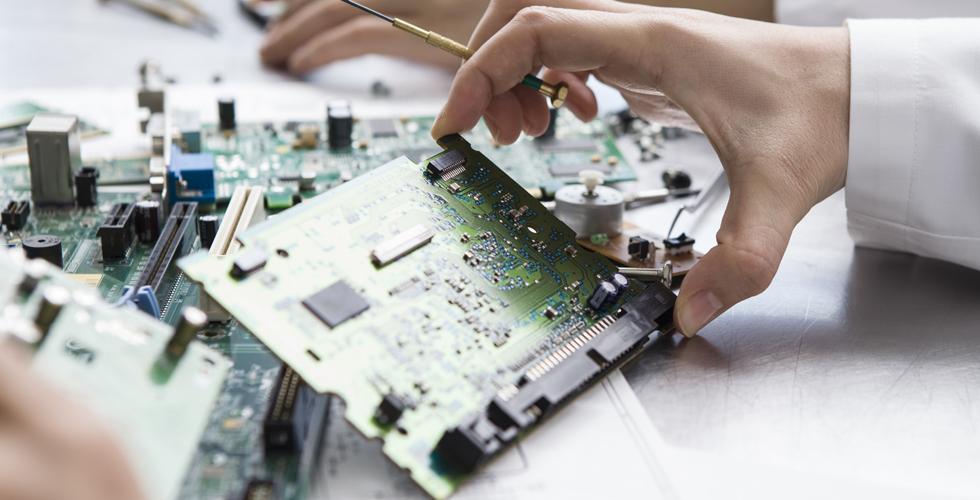Electronics
》 Software
》 Electronics
》 Machinery
Job summary of electronic engineers
Electronic engineers design the circuit boards that form the heart of equipment and devices and they conduct reliability assessments of such systems.
Design areas include Electrical Equipment (electrical design, production facilities, and relevant technologies), Electronic Circuits (electronic circuit design for printed circuit boards), and Electronic Devices (development of integrated circuits and individual electronic devices, and design of peripheral circuits).

》 Corresponding jobs and necessary skills
》 Track record
》 Basic training
》 Customized training (practical training)
》 In-house training facilities
Corresponding jobs and necessary skills for electronic engineers
Electrical equipment
Corresponding jobs
•Engineers involved in the electrical design and evaluation of production equipment and devices, such as semiconductor manufacturing equipment
•Engineers involved in the development and evaluation of automobiles (fuel cells, batteries, automated driving, wire harnesses, etc.)
•Engineers involved in electrical design (switchboards, control boards, etc.) concerning the construction of large facilities, production lines, etc.
Necessary skills
•Since control boards and software are necessary for the control of equipment, devices, automobiles, etc., basic knowledge of electrical/electronic circuits and programming languages is necessary.
•Since large equipment handles high voltages, knowledge concerning high voltages is necessary, in addition to knowledge of low voltages necessary for circuit boards.
•Since products are developed and evaluated in their finished state and not as individual electrical/electronic circuit boards, their mechanical parts and materials are mutually influential on each other in terms of noise and durability. Thus, basic knowledge of machinery is also necessary.
•Since knowing how a device will impact its semiconductors is necessary for the design of semiconductor manufacturing equipment and production equipment, knowledge in semiconductor science and engineering is necessary.
•Basic handling of measuring equipment is necessary to check whether equipment is operating as it should.
Electronic circuits
Corresponding jobs
•Engineers involved in the design of electrical circuits using passive components (resistors, capacitors, etc.) and active components (transistors, ICs, etc.), as well as the design of printed circuit boards
•Engineers mainly involved in the design of control and power circuits for automobiles and home appliances
•Engineers involved in the design of circuits that generate output signals to actuators and display devices based on input signals from sensors, switches, etc.
•Engineers involved in evaluation tests that take into consideration a product’s use environment, such as factors like noise, temperature, and humidity
Necessary skills
•Basic knowledge concerning microcontroller-based digital circuits and transistor-based analog circuits is essential.
•The ability to read and comprehend datasheets is necessary to understand the characteristics and shapes of the electronic parts used.
•Handling of measuring equipment to visualize control signals is necessary to evaluate whether circuits are working as designed.
•The greatest enemy of control circuits is noise. Thus, knowledge of measures for imparting resistance to external noise and ways to prevent the generation of noise from designed products is necessary.
•Since almost all products in recent years are capable of connecting to the Internet and peripheral devices, knowledge concerning telecommunications is also necessary.
Electronic devices
Corresponding jobs
•Engineers involved in the development of electronic devices themselves, such as LSI and FPGAs
•Engineers involved in the development of semiconductor manufacturing equipment, particularly in the semiconductor manufacturing process
•Engineers involved in the development of detectors, such as sensors and cameras, as the development of automated driving has progressed
•Engineers involved in evaluations for embedded development, particularly including the peripheral circuits of microcontrollers
Necessary skills
•Since our development targets are mainly semiconductor parts (microcontrollers, LSI, FPGAs, sensors, etc.), basic electrical knowledge is essential. In particular, since the operation of semiconductor parts is configured using MOSFETs (CMOS), development cannot happen without knowing about them.
•Basic knowledge of software is essential for product development. In particular, since most of our designs use HDLs, code design and data analysis for the design, validation, and evaluation phases are necessary.
•Demand for semiconductor devices has been increasing in recent years due to technological developments in AI and IoT. Thus, knowledge of signals, machine learning, image analysis, etc., is also necessary.
Track record of electronic engineers
Artner’s electronic engineers have a proven track record in a wide variety of projects in the core areas of manufacturers’ business processes.
Training programs and in-house training facilities for electronic engineers
At our extensive in-house training facilities, new electronic engineers receive two levels of specialized training: basic training and customized training (practical training).
Basic training
The trainees will be retrained from scratch, reviewing what they learned in school.
This practical training curriculum involves focusing on how to apply the knowledge learned in school to actual development work.
》 Curriculum details
Customized training (practical training)
This training focuses on specific client company operations to provide process-based education that matches the needs of each workplace. The trainees will acquire a wide range of necessary technical skills, from basic to application.
》 Curriculum details

